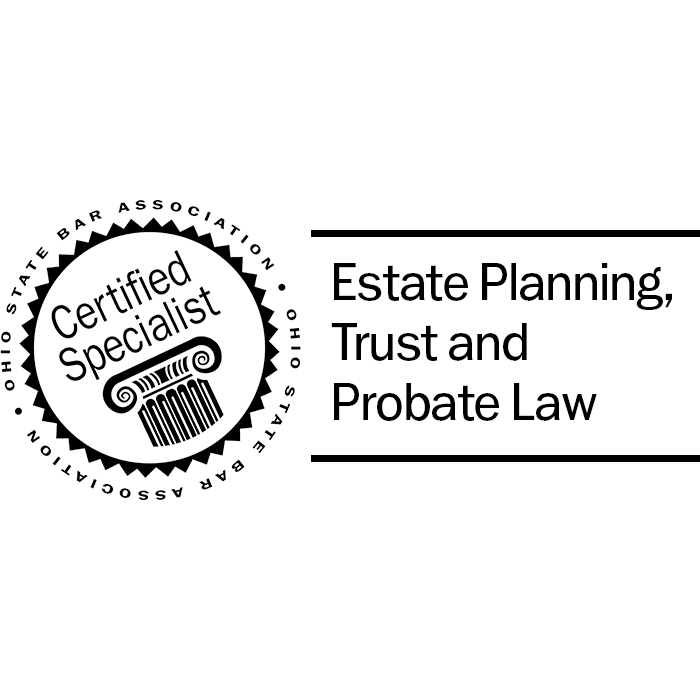
The practice of Estate Planning, Trust, and Probate Law involves representing clients in matters related to the management and transfer of assets, the creation of wills and trusts, and the administration of estates. This includes handling a range of issues, from drafting estate plans and managing trusts to guiding clients through the probate process and addressing disputes over estates.
The Ohio State Bar Association offers board certification in Estate Planning, Trust, and Probate Law to attorneys who have fulfilled stringent criteria, demonstrating their proficiency and experience in this specialized area. To achieve this certification, attorneys must have significant practice experience in estate planning, trust, and probate law, pass a comprehensive written examination, and receive favorable peer evaluations, ensuring they meet the high standards set by the Ohio State Bar Association.
When searching for an estate planning, trust, and probate law attorney in Ohio, it is important to consider whether the attorney is board certified in this specialty by the Ohio State Bar Association.
The OSBA's Specialization Committee is responsible for certifying attorneys as specialists in various practice areas. This certification process is regulated under specific rules and guidelines established by the Ohio Supreme Court and the OSBA.
The Estate Planning, Trust, and Probate Law Board Certification offered by the OSBA recognizes attorneys who possess advanced expertise in handling cases involving estate planning, trust administration, and probate matters. This certification ensures that certified lawyers have demonstrated substantial experience and knowledge, adhering to the high standards set by the OSBA.
There are several benefits to obtaining a board certification in estate planning, trust, and probate law. Certification signals high expertise in this area of law, assuring clients of the attorney's skills and experience. Furthermore, certified specialists stand out in a competitive legal market, enhancing their reputation and credibility.
Lawyer Legion maintains a directory of board certified estate, trust, and probate law specialists in Ohio. This directory provides the public with a valuable resource that allows them to narrow their search to local attorneys who have earned board certification in estate, trust, and probate law by the Ohio State Bar Association.
Lawyer Legion is the only commercial lawyer directory to properly acknowledge all ABA-accredited specialization programs and provide a dynamic directory of virtually every lawyer who has earned each certification, including board certification in estate, trust, and probate law by the Ohio State Bar Association.
Use this directory to connect with lawyers who are board certified specialists in estate, trust, and probate law by the Ohio State Bar Association. Start by choosing your county from the list below.
The Ohio State Bar Association (OSBA) offers board certification in Estate Planning, Trust, and Probate Law to attorneys who demonstrate substantial involvement and expertise in this specialized field. The certification process is rigorous and designed to ensure that certified attorneys possess a high level of skill and professionalism. Below are the key requirements for obtaining board certification in this area.
These requirements ensure that only attorneys with significant experience and expertise in Estate Planning, Trust, and Probate Law receive board certification, thereby maintaining high standards in the legal profession.
The Ohio State Bar Association (OSBA) provides a detailed and rigorous process for attorneys seeking certification in Estate Planning, Trust, and Probate Law. The process ensures that applicants meet high standards of experience, knowledge, and ethical practice.
Application Form Completion:
Peer Review and Recommendations:
Written Examination:
Good Standing and Liability Insurance:
Disclosure of Disciplinary Actions:
Continuing Legal Education (CLE):
Submission of Materials: Once all components of the application are completed, the applicant submits the materials to the OSBA. The Specialty Board, responsible for overseeing the certification process, reviews the application, peer references, exam results, and other relevant documentation.
Approval: If the Specialty Board finds that the applicant has met all the necessary requirements, they will recommend certification. The certification will be effective on January 1st following the Specialty Board’s decision.
This comprehensive application process ensures that only highly qualified attorneys are certified as specialists in Estate Planning, Trust, and Probate Law, thereby maintaining high standards within the profession.
The Ohio State Bar Association (OSBA) has established specific annual duties and recertification requirements for attorneys who are certified as specialists in Estate Planning, Trust, and Probate Law. These requirements are in place to ensure that certified attorneys maintain their expertise and stay up-to-date with developments in their field.
Annual Report Submission:
Continuing Legal Education (CLE):
Annual Fee Payment:
Certification Period:
Recertification Application:
Criteria for Recertification:
Exemptions:
Material Changes:
Immediate Decertification:
These annual duties and recertification requirements ensure that certified specialists in Estate Planning, Trust, and Probate Law continue to uphold the highest standards of legal practice and remain current in their field. For more detailed information, please refer to the OSBA standards document.
